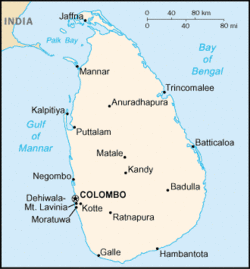Welcome to the Virtual Education Wiki ~ Open Education Wiki
Sri Lanka: Difference between revisions
No edit summary |
(CSV import United Nations members - Albania was done manually) |
||
| (One intermediate revision by the same user not shown) | |||
| Line 129: | Line 129: | ||
{{#set:In Commonwealth=1}} | {{#set:In Commonwealth=1}} | ||
{{Countries-footer}} | |||
{{United Nations}} | |||
Latest revision as of 14:50, 10 May 2023
by Paul Bacsich
For entities in Sri Lanka see Category:Sri Lanka
Partners situated in Sri Lanka
None.
Sri Lanka in a nutshell

(sourced from http://en.wikipedia.org/wiki/Sri_Lanka - but note the current disputes)
Sri Lanka (from the Sanskrit for "Venerable Island"), officially the Democratic Socialist Republic of Sri Lanka (Sinhalese: ශ්රී ලංකාව, Tamil: இலங்கை; known as Ceylon before 1972 and as Taprobane in ancient times), is an island country in South Asia, located about 31 kilometres (19.3 mi) off the southern coast of India.
The population of Sri Lanka is 20 million.
Its capital city is Sri Jayawardenapura Kotte but the largest city is Colombo.
Sri Lanka is divided into 9 provinces and 25 districts. Each province is administered by a directly-elected provincial council.
Sri Lanka education policy
Sri Lanka has a free education system which dictates 9 years of Compulsory Schooling for every child is in place, with 99% of the children entering the first grade. With a literacy rate of 92%, and 83% of the total population having had Secondary Education, Sri Lanka has one of the most literate populations amongst developing nations.
There is a separation of the administration of schools between the central government and the provincial government. Thus the elite National Schools are controlled directly by the Ministry of Education and the provincial schools by the provincial government.
Sri Lanka education system
Most schools in Sri Lanka provide education from grades 1 to 13 in the same institution. Students sit for the GCE Ordinary Level Examination (O/Levels) in grade 11 and the GCE Advanced Level Examination (A/levels) in grade 13, conducted by the Department of Examinations. These schools are modeled on British colleges. A majority of them are public, but a number of private schools do exist. While most reputed National and Private Schools centered around large cities are usually single-sex institutions, rural provincial schools tend to be coeducational. In recent decades, a large number of international schools have been established across the nation. In these schools General Certificate of Secondary Education, International Baccalaureate and Cambridge International Examinations are popular education programmes.
Higher education
Universities in Sri Lanka
Sri Lanka has 16 public universities. They include the
- University of Colombo
- University of Peradeniya
- University of Kelaniya
- University of Sri Jayewardenepura
- University of Moratuwa
- University of Peradeniya
- University of Jaffna
- University of Ruhuna
- Eastern University of Sri Lanka
- Sabaragamuwa University of Sri Lanka
- Wayamba University of Sri Lank - and the
- Open University of Sri Lanka
However the lack of space in msny of these institutions and the unwillingness of the government to establish private universities has led to a large number of students been denied entry into formal universities as well as high undergraduate unemployment. As a result, a number of specialised public and private institutions have emerged which provide specialised education in a variety of fields, such as computer science, business administration and law. These include the government-owned Sri Lanka Institute of Information Technology and the Institute of Technological Studies.
For a list see http://en.wikipedia.org/wiki/List_of_universities_in_Sri_Lanka
Polytechnics in Sri Lanka
Some institutions can award undergraduate degrees only. These include:
- Institute of Technological Studies
- Institute of Surveying and Mapping
- Aquinas College of Higher Studies
- National Institute of Social Development
- National Institute of Business Management (Sri Lanka)
Higher education reform
The Bologna Process
Administration and finance
Quality assurance
Sri Lanka's HEIs in the information society
Towards the information society
Information society strategy
Virtual Campuses in HE
Interesting Virtual Campus Initiatives
See the Open University of Sri Lanka.
Interesting Programmes
See the University of Colombo School of Computing, but note that this appears a pilot programme only.
Re.ViCa Case-study
None.
Lessons learnt
References
For OER policies and projects in Sri Lanka see Sri Lanka/OER